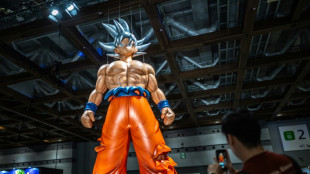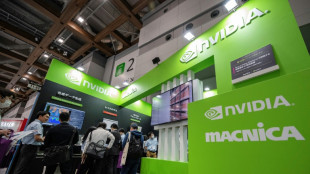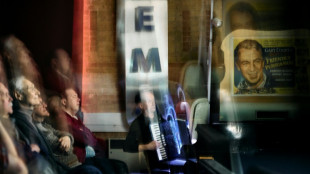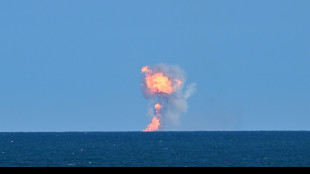
-
 Magritte painting nets auction record of $121 million
Magritte painting nets auction record of $121 million
-
Markets fluctuate as traders weigh geopolitical tensions

-
 N. Korea's latest weapon? Bombarding South with noise
N. Korea's latest weapon? Bombarding South with noise
-
'Kidnapped' Uganda opposition figure Besigye to appear at military court: lawyer

-
 Asian markets fluctuate as traders weigh geopolitical tensions
Asian markets fluctuate as traders weigh geopolitical tensions
-
'An inauspicious day': the landmines ruining Myanmar lives

-
 UN to vote again on Gaza ceasefire, US plans unclear
UN to vote again on Gaza ceasefire, US plans unclear
-
Japan's manga powerhouse 'Dragon Ball' turns 40

-
 Japanese, Koreans bottom of global love life survey
Japanese, Koreans bottom of global love life survey
-
Son blames 'mistakes' after South Korea held by Palestine in qualifier

-
 Japan ramps up tech ambitions with $65 bn for AI, chips
Japan ramps up tech ambitions with $65 bn for AI, chips
-
Lights, action, melodrama! Silent films get new reel at London haven

-
 Myanmar led world in landmine victims in 2023: monitor
Myanmar led world in landmine victims in 2023: monitor
-
ICC to sentence Timbuktu war criminal

-
 Ugandan opposition figure Besigye 'kidnapped', says wife
Ugandan opposition figure Besigye 'kidnapped', says wife
-
Australia's Jason Day eyes more major glory after resurgence

-
 Machu Picchu security boosted after visitors spread human ashes
Machu Picchu security boosted after visitors spread human ashes
-
Popovic hails Australia character in 'crazy' World Cup qualifier

-
 Taliban govt clearing 'un-Islamic' books from Afghanistan shelves
Taliban govt clearing 'un-Islamic' books from Afghanistan shelves
-
Argentina beat Peru as Uruguay hold Brazil

-
 Asian markets struggle as traders weigh geopolitical tensions
Asian markets struggle as traders weigh geopolitical tensions
-
Tatum stars as Celtics end Cavaliers unbeaten start

-
 Hurting India under pressure in blockbuster five-Test Australia series
Hurting India under pressure in blockbuster five-Test Australia series
-
'They killed her dream': Israel strike leaves woman footballer in coma

-
 Iraq holds its first census in nearly 40 years
Iraq holds its first census in nearly 40 years
-
Iraqis face tough homecoming a decade after IS rampage

-
 Russian net tightens around last civilians left in eastern Ukraine
Russian net tightens around last civilians left in eastern Ukraine
-
Olympic champion Tebogo aims to inspire next generation of African athletes

-
 Valencia on target as ten-man Ecuador upset Colombia
Valencia on target as ten-man Ecuador upset Colombia
-
'Rust' to premiere three years after on-set shooting

-
 Strike at French cognac maker Hennessy over measures in China spat
Strike at French cognac maker Hennessy over measures in China spat
-
Xi, Lula meet in Brasilia to 'enhance ties'

-
 SpaceX fails to repeat Starship booster catch, as Trump watches on
SpaceX fails to repeat Starship booster catch, as Trump watches on
-
'I have left a legacy': Nadal retires from tennis

-
 US recognizes Venezuela opposition's Gonzalez Urrutia as 'president-elect'
US recognizes Venezuela opposition's Gonzalez Urrutia as 'president-elect'
-
European powers, US seek to censure Iran at UN nuclear watchdog board

-
 UNAIDS chief says husband, Ugandan opposition figure Besigye, 'kidnapped'
UNAIDS chief says husband, Ugandan opposition figure Besigye, 'kidnapped'
-
Nadal's sensational career ends as Netherlands defeat Spain in Davis Cup

-
 US announces talks with Israel over civilian casualties in Gaza
US announces talks with Israel over civilian casualties in Gaza
-
SpaceX fails to repeat Starship booster catch, as Trump looks on

-
 G20 summit ends with Ukraine blame game
G20 summit ends with Ukraine blame game
-
Trump appoints TV celebrity 'Dr. Oz' to key US health post

-
 European stocks fall on Ukraine-Russia fears, US focused on earnings
European stocks fall on Ukraine-Russia fears, US focused on earnings
-
Last-gasp Szoboszlai penalty rescues Hungary draw with Germany

-
 Germany, Netherlands draw as Nations League group stage ends
Germany, Netherlands draw as Nations League group stage ends
-
Hong Kong tycoon Jimmy Lai takes witness stand in collusion trial

-
 Guardiola set to extend stay as Man City boss - reports
Guardiola set to extend stay as Man City boss - reports
-
Minnows Botswana hold Egypt to qualify with Mozambique, Tanzania

-
 Inter Miami coach Martino leaving club for 'personal reasons' - club source
Inter Miami coach Martino leaving club for 'personal reasons' - club source
-
Chinese man sentenced to 20 months for Falun Gong harassment in US


UK Labour's move to tax private schools stirs passions
UK's Labour government has vowed to tax private schools in order to boost public education and create thousands of teaching posts, but the policy is causing concern for families already hard-pressed to meet the fees.
Prime Minister Keir Starmer, who took office after the general elections of July 4, has repeatedly said that he has "nothing against private schools", which educate around 600,000 children, or 6.5 percent of the country's pupils.
But "every parent has aspiration for their children whether they go to private school or not", added Starmer, whose two children went to a state school in their north London neighbourhood.
"For those children in state secondary school who don't have the teachers they need, that is a lifelong problem," he said.
After years of tight public spending and worsening inequalities, the government confirmed in July that it would remove the value added tax exemption for tuition fees paid to private schools.
It hopes the move will raise £1.6 billion ($2.1 billion), which will be used to fund 6,500 new teachers in the public sector.
Private schools will have to pay 20 percent VAT on fees received from January 1, heralding hefty increases in bills for parents.
Tuition fees in private schools already average £18,000 a year, according to the Independent Schools Council (ISC), which represents private schools.
- 'Anxiety' -
The move has stirred strong emotions in the UK, which boasts a raft of world-renowned, super-exclusive schools that have educated many members of the ruling class.
But panicked testimony from parents of more humble means have filled newspapers in recent months.
Some say they will have to postpone their retirement, change jobs, forgo holidays or call on their own parents for help to cover the bills.
Others are considering moving to be closer to a good state school.
Amaka Nwabueze is thinking of working a second job.
"My life is already busy, so I might have to take a second job for weekends, which means I would barely see my children," the 45-year-old financial analyst, who looks after her three children on her own, told AFP.
Her two eldest children already switched to selective state schools, which hold entrance exams, when they moved on to secondary school but the youngest failed.
He was offered another school, which his mother called "the worst" in her London neighbourhood.
"I cannot take my child from a private primary school to a failing secondary school," she added, saying she was expecting a £4,000 hike in annual fees.
"It's giving me high blood pressure," she said.
"There is real anxiety," added Tony Oulton, headmaster of Hulme School in Oldham, northwest England, which has 730 pupils aged between two and 18.
He criticised the policy, which he believes is wrongly based on "assumptions that they (private school parents) are all wealthy and can afford the cost of VAT".
Parents at his school are "mostly working class, lower middle class, aspirational, hardworking", with "many of them working two jobs in order to pay the fees", he explained.
- Widening disparity -
Opponents of the reform claim that state school enrolment will explode if the private sector is lost, increasing the cost to the government.
But studies contradict this.
The Institute for Fiscal Studies (IFS) calculated that the number of children in state schools will actually fall by 2030 due to a projected population decline.
Several research centres also point out that the disparity between private and state schools widened sharply under the 14-year Conservative rule.
"Fees have increased significantly in private schools, while spending in the state has been cut until last year," explains Harry Quilter-Pinner, interim director at the Institute for Public Policy Research (IPPR) charity.
"State schools over the last 10-15 years have had to be innovative about how they spend their money. And I think the Labour government is asking private schools to do the same thing," he added.
H.Romero--AT
